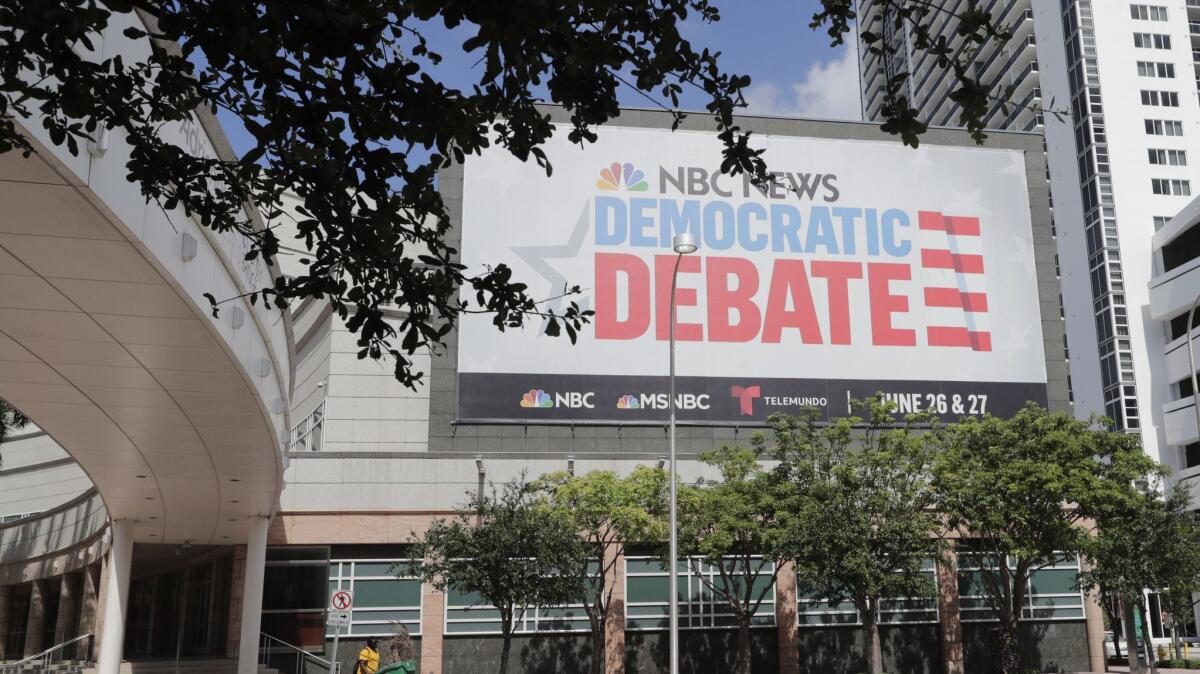Op-Ed: The Democratic presidential candidates will do something tonight, just don’t call it a debate

- Share via
When 20 Democratic presidential candidates gather in front of TV cameras this week, there will be no controversy about what to call the event. But there should be. Even if organizers, candidates and journalists all say it’s a debate, that doesn’t make it one.
To understand how far removed it will be from a presidential debate in any meaningful sense of that phrase, just take a look at a real one. One telling example is the first of the televised genre, between Richard Nixon and John F. Kennedy, broadcast on Sept. 26, 1960. (Three more were held in the following weeks.) To watch or read the transcript, click here or here.
Watching only 20 minutes of the YouTube version is enough to show how stunningly wide a gap looms between that event and what we call debates today. The contrast smacks you in the face. In their words and manner both candidates make it clear they understand the event as an occasion to explain their understanding of national issues and the policies they espoused.
Nixon’s and Kennedy’s opening statements and their responses to questions — all far longer than in modern-era debates — were delivered in complete sentences and loaded with factual detail: How to analyze comparative economic growth rates in the United States and the Soviet Union, whether federal education aid dollars should go to building schools or teachers’ salaries, the intricacies of farm subsidies and other complicated issues.
To understand how far removed it will be from a presidential debate in any meaningful sense of that phrase, just take a look at a real one.
The candidates’ faces and their body language showed unmistakably that each was concentrating on the issue he was addressing, not waiting to deliver a prefabricated 10-second sound bite (a term lexicographers say didn’t exist in 1960) that he hoped would be the only thing voters would remember. Nor were the candidates or their questioners listening chiefly for some damaging gaffe that would dominate the next couple of news cycles.
The Kennedy-Nixon debates were not necessarily a model of public education. Historians still argue whether substance or style was more important to the television audience. Conventional wisdom holds that Kennedy was the winner in that first debate, but nearly all analysts concluded it was not his ideas that triumphed but his appearance and personality. He came across as vigorous, attractive and engaging, in contrast to Nixon’s uneasy expression and manner (and famously, his unshaven look caused by studio lighting and no stage makeup).
Some scholars have suggested that maybe appearance outweighed content because there was too much substance for the audience to take in, that both candidates gave more details than most watchers could follow. That alone suggests that what Kennedy and Nixon conducted was far closer to a “presidential debate” than what we’ll be treated to this campaign season.
Enter the Fray: First takes on the news of the minute »
If we don’t call the coming presentations a debate, what should we call them? Here’s one suggestion: a pageant. As in beauty pageant.
Instead of debaters, the Democrats on stage in Florida will much more closely resemble contestants parading on a boardwalk, striking poses, trying to look glamorous and charming to the judges, and inwardly praying for the others to trip on their real or metaphorical high heels and take an embarrassing tumble into the seats and out of the competition.
I understand that pundits and media types and candidates won’t give up the traditional name for these quadrennial spectacles — that would diminish their supposed news value. But taking the word “debate” out of our campaign vocabulary would be a tiny step toward more honest political conversation, which heaven knows this country very badly needs.
Arnold R. Isaacs is an author, regular contributor to TomDispatch and a former Baltimore Sun reporter. arnoldisaacs.net
Follow the Opinion section on Twitter @latimesopinion and Facebook
More to Read
A cure for the common opinion
Get thought-provoking perspectives with our weekly newsletter.
You may occasionally receive promotional content from the Los Angeles Times.






